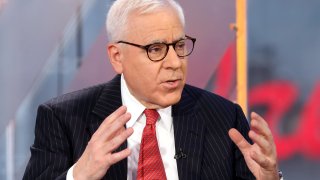
- "Cryptocurrency is not going away, just like gold is not going away," Carlyle Group's David Rubenstein told CNBC on Thursday.
- The private equity titan said he's personally invested in companies that facilitate crypto trading.
- Rubenstein is one of a growing number of high-profile investors to tout the long-term viability of digital assets.
Billionaire private equity titan David Rubenstein told CNBC on Thursday he believes cryptocurrencies will remain a part of the financial landscape for years to come, dismissing concerns that the burgeoning asset class is a fad destined to fade away.
In an interview on "Squawk Box," Rubenstein said he's personally invested in companies that facilitate crypto trading, although not the digital tokens directly. "I did that, in part, because I think it's here to stay. Cryptocurrency is not going away, just like gold is not going away," the Carlyle Group co-founder and co-chairman said, adding some investors see bitcoin as a substitute for gold.
Get Connecticut local news, weather forecasts and entertainment stories to your inbox. Sign up for NBC Connecticut newsletters.
Rubenstein's comments Thursday came one day after a hugely volatile day for bitcoin, the world's largest cryptocurrency by market capitalization, and a host of other digital assets. The entire crypto market saw hundreds of billions of dollars of value wiped out after bitcoin plunged more than 30% at its lowest point Wednesday to around $30,000 per token. Bitcoin later recovered some of those losses and traded back up over $41,000 on Thursday.
"It has its ups and downs, and yesterday was not a good day," Rubenstein said, referring to Wednesday's collapse. "But that's true of anything that is relatively new, and I don't think you're going to see anything like crypto going away and disappearing. It's here."
Bitcoin and other digital coins traded off their session highs after the Treasury Department on Thursday called for stricter cryptocurrency compliance with the IRS.
Money Report
Anthony Scaramucci, founder of hedge fund SkyBridge Capital, shared Rubenstein's view around volatility, saying later on "Squawk Box" that bitcoin's plunge Wednesday was hardly a historic anomaly. "I think the bull market is intact for bitcoin. If you go back over the different slides in bitcoin over the last 12 years, this is consistent with those slides," Scaramucci said.
Some people remain skeptical of bitcoin, even as Rubenstein and a range of other high-profile investors tout its long-term viability. For example, Berkshire Hathaway Vice Chairman Charlie Munger said earlier this month that the "whole damn development" of bitcoin is "disgusting and contrary to the interests of civilization."
Rubenstein said that whether people think bitcoin and cryptocurrencies are "right or wrong," it's clear that there's an appetite for an alternative to the current financial system. "It's here because people in the market want something other than just the traditional currencies that we've had," he said.
"If you go into cryptocurrencies, you should expect big ups and downs and big fluctuations. If you're not prepared for that, don't go into cryptocurrency," added Rubenstein, who co-founded Carlyle in 1987 after serving in the Jimmy Carter administration.
For crypto investors, one lingering question is whether the U.S. government will step up its regulation of digital assets. Securities and Exchange Commission Chairman Gary Gensler, who is new to the role, told CNBC earlier this month that he believes "we need greater investor protection" around bitcoin.
"To the extent that something is a security, the SEC has a lot of authority. And a lot of crypto tokens — I won't call them cryptocurrencies for this moment — are indeed securities," Gensler said May 7 on "Squawk Box."
Rubenstein weighed in on the prospect of more regulation, saying the idea that "the government is going to be able to stop cryptocurrency from being something investors want is unrealistic at this point."






